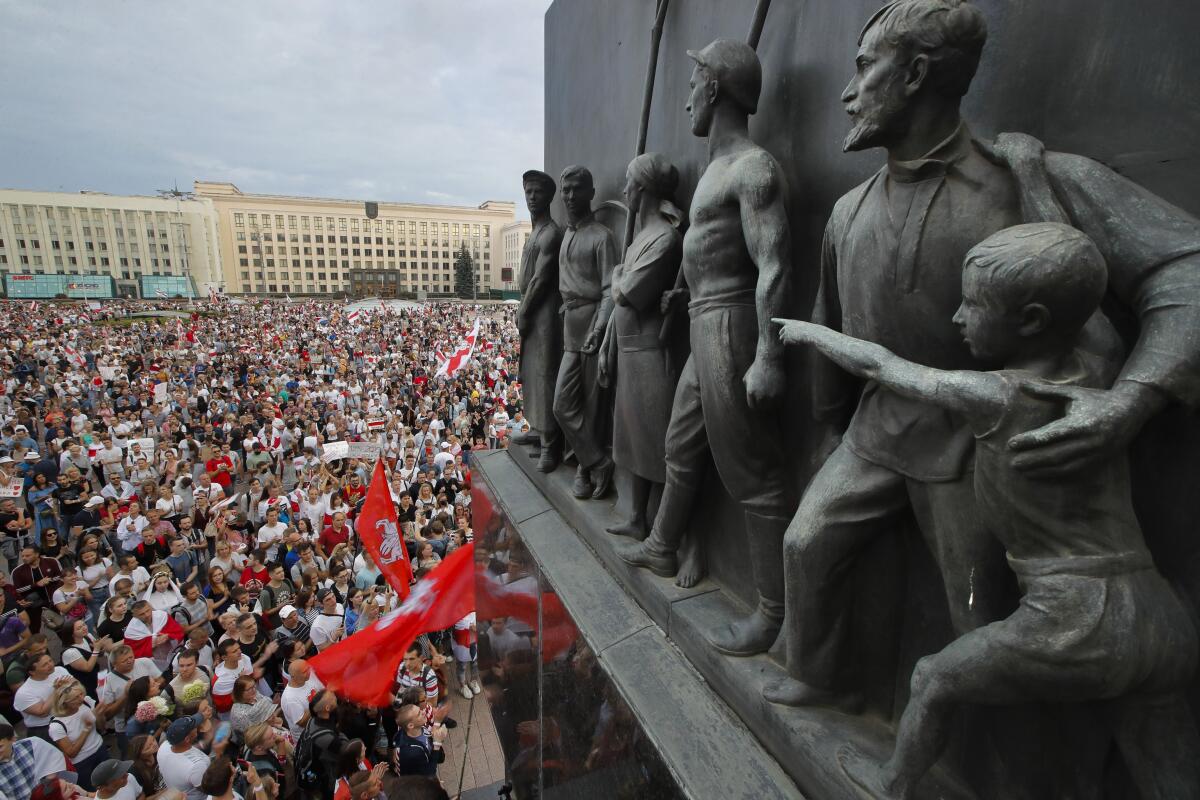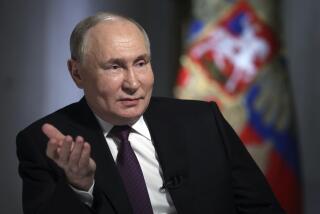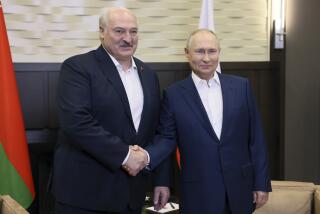Op-Ed: The Belarus crisis is a problem for Moscow. Here’s how Putin might respond

Russian President Vladimir Putin is no fan of revolutions. As massive demonstrations and strikes roil the cities of neighboring Belarus, he cannot like what he sees. The question on everyone’s mind is what he will do about it.
Putin has little affection for Belarus’ widely loathed president, Alexander Lukashenko, who claimed victory in the Aug. 9 presidential election, which observers say was fraudulent. Over the years, the Belarusian strongman has alternately cadged aid from Moscow and played the anti-Russian card to rally support at home. Just a few weeks ago, he arrested a team of Russian mercenaries transiting through Minsk and threatened to deliver them to Ukraine, where some were accused of terrorist activities.
But, as a groundswell of protest over electoral fraud threatens to overthrow Lukashenko’s regime, the stakes for Moscow are high.
With Ukraine — except for Crimea and its Donbas region — now firmly in the Western orbit, the “loss” of another Slavic republic from Russia’s sway would be humiliating to Putin and many around him. Although Belarus lacks the cultural resonance of Crimea, its history links it closely with Russia.
A region within the tsarist empire, Belarus was one of the original Soviet republics and the site of bloody battles in World War II. For many Russians, Belarus is — as Putin’s spokesman Dmitri Peskov put it on Wednesday — a “brother land” inhabited by a “brother people.”
The crisis also catches Putin at a difficult moment. In the eastern Russian city of Khabarovsk, large crowds have been demonstrating for weeks against the Kremlin’s arrest of a locally popular governor. Putin’s handling of the coronavirus, shunting responsibility onto regional governors, smacks of weak leadership. In April, his approval rating slipped to just 59%, its lowest level since he took office.
Given all this, some see a danger that Putin might intervene forcibly in the Belarusian crisis in the hope of rekindling his domestic support with a repeat of the Crimean episode.
That is possible, but unlikely. Any action to rescue Lukashenko or advance integration of the two states would not be popular in Russia. Lukashenko’s defiant brutality in recent days has shocked many. And, unlike in the case of Crimea, most Russians do not wish to see Belarus annexed. According to a recent poll, only 23% of Russians favor incorporating Belarus or joining the two countries in a new state under a common government.
Any Russian military intervention would also arouse a furious response from the Belarusian public, which so far remains well-disposed toward its larger neighbor. Polls suggest that three-quarters of Belarusans favor friendly, visa-free relations with Russia. But only 4% would like to see their country incorporated as a Russian region.
At this point, Putin looks undecided. So far, Russian state media and pro-Kremlin politicians in the Duma have been expressing a range of views. That suggests they have not yet received clear guidance from above.
If Moscow were to intervene, it has more effective levers than overt force. In the age of hybrid war, it can shape events through the networks of influence Russian security services have built up over the years. A Russian government plane used to carry the head of the FSB, the federal security service, was spotted flying to Minsk from Moscow and back during the night of Aug. 18.
Another lever is the media. After employees started to walk out at Belarus’ state TV company to protest censorship, two Russian planes flew in on Tuesday carrying teams of TV workers to replace them, according to the company’s former director. Then there is economic pressure. Belarus is highly dependent on cheap Russian oil and gas, which it re-exports at a markup, earning huge profits. Whether Lukashenko or someone else, the country’s leader will need continuing Russian cooperation.
What could provoke Putin into more overt action would be signs of Western interference. Demands for closer relations with the European Union or NATO might also spark a harsh reaction.
In phone calls with Chancellor Angela Merkel of Germany and President Emmanuel Macron of France on Tuesday, Putin warned that any outside intervention would be “unacceptable.” Spokesman Peskov complained this week that “attempts at such direct intervention are taking place.”
To reassure Moscow, the newly-formed Coordinating Council of the Belarus opposition issued a statement on Wednesday pledging not to change the country’s “constitutional order and foreign policy course.” It called on Lukashenko to halt violence, release political prisoners and hold new elections under a new electoral commission.
For their part, EU leaders said Wednesday that they would not recognize the results of the Aug. 9 election. But echoing Putin’s words, they also insisted that there should be no outside interference. “Belarus must find its own path for itself,” Chancellor Merkel said.
That path will require skillful balancing. Lukashenko has survived for 26 years by playing Russia against Europe while concentrating power at home. But the civic maturity shown by Belarusian protesters suggests society has outgrown its dictator. Lukashenko’s day may be over — if not now, then soon. But his successors will need both talent and toughness to build a thriving democracy while holding Russia at bay.
Daniel Treisman is a professor of political science at UCLA. He is the editor of “The New Autocracy: Information, Politics, and Policy in Putin’s Russia.”
More to Read
A cure for the common opinion
Get thought-provoking perspectives with our weekly newsletter.
You may occasionally receive promotional content from the Los Angeles Times.










